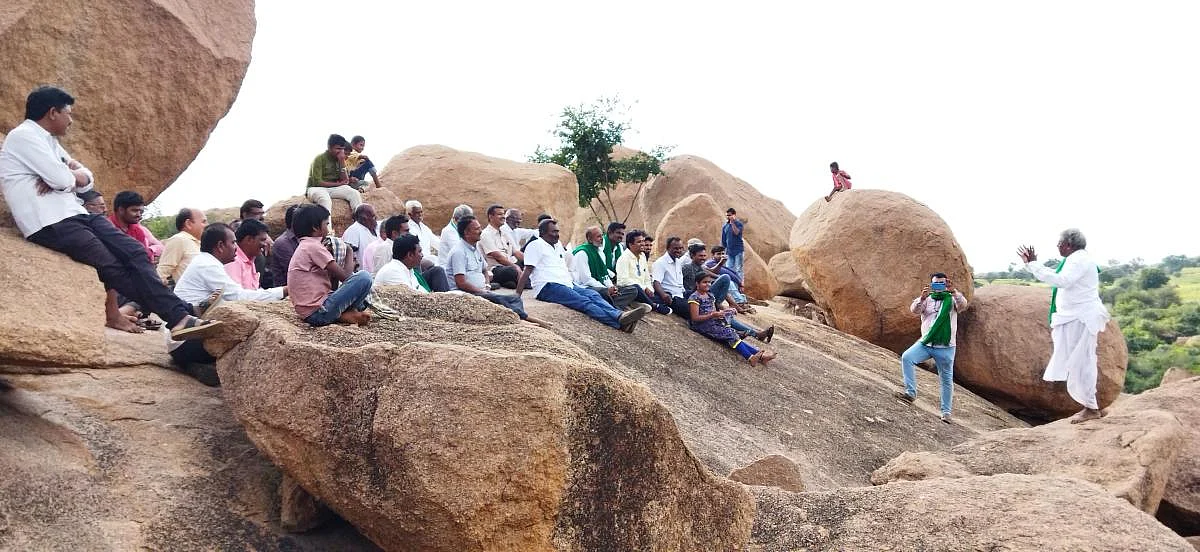
Basavaraj Sharanappa Sajjan has attended over a dozen training programmes organised by the agriculture and horticulture departments.
The 28-year-old farmer from Koppal says these meetings are “dominated by scientists” and he has not gathered the courage to interact with them even once.
With Manninondige Matukate, a network of farmers, he now has a channel to share his views and listen to other farmers. "Every farmer is free to talk in this forum. We can be ourselves in the company of fellow farmers — both peers and seniors," he says.
The discussions here have given him the confidence to fix the price of his crops (earlier set by the middlemen) and the courage to face failure.
When farmer-journalist Anandateertha Pyati and agriculture scientist P R Badriprasad started the forum in February 2020, they had agreed on two aspects: It should be an informal forum where farmers decide what they want to learn and create together. It should not be bound by any institutional framework.
They can discuss, debate, and listen — all in farmers' fields. And in the process, the initiative is owned by farmers themselves.
“We wanted the forum to go beyond the notion that only success needs to be shared, and that someone else has to decide what information farmers need,” says Badriprasad, assistant professor, College of Agriculture, Gangavati.
Pyati, who has seen the benefits of being a part of farmer networks and the confidence it instills in you, wanted a similar support system to evolve in the arid lands of Koppal. “We achieved this in less than a year’s time. Now people from other districts are also approaching us,” he says.
So how does Manninondige Matukate (Soil Dialogues) work?
Every month, one farmer hosts other farmers for a day, where they share successes and failures, the challenges they face and ideas they have. They help each other in whatever way they can.
With no institutional binding or designated office bearers, every participant is equally responsible for the success of the event. They sit together and decide if they want to go on a field trip, or where the next month’s programme can be organised. If a farmer wants to host the programme but can’t afford to, the group pools in money.
So far, 16 such meetings have been held in different parts of Koppal district, with an average of 150 farmers participating.
Every event is unique. For instance, on February 14, 2021, they celebrated 'Green lovers' Day' which saw over 100 families participate.
The day was dedicated to understanding their soil better and in the process, they collected and studied 35 types of soil found locally.
On December 5, 2021, the group celebrated 'World Soil Day' by learning ways of nourishing soil using organic manure. Other topics generally covered in these meetings are sustainable farming, forest farming, agro-forestry, organic certification, water harvesting etc.
"Whenever possible, we invite veteran farmers and experts with hand-on knowledge to share their experience with us," says Pyati.
After an interaction with water conservationist N J Devaraja Reddy, many members started rainwater harvesting.
Nurturing interests
"When I wanted to grow Bengal gram on my land, I knew exactly where to turn," says Kiran Shedde, who started farming after quitting his job in Bengaluru. His fellow farmers advised against growing the crop in red soil. "I still experimented on a small patch of land and their concerns proved right," he says.
Regular participation in these meetings has allowed Kiran to explore and nurture his other interest: Books. An avid reader, he always wondered why books are not easily accessible to people in North Karnataka, unlike the south.
After discussions at the forum, he plunged into the field and is now a successful seller of books on agriculture.
It is this network that gave Shripadaraj Muradi — who returned to farming in his ancestral farm in Koppal district after serving in the Indian Air Force for 15 years — the recognition as a farmer.
"People in my village (Achartimmapur) started taking me seriously after they saw farmers visiting my farm. I even hosted a Manninondige Matukate programme," he says. He also gets to participate in farmers' meets in other parts of the state, which he says is invaluable to a new entrant like him.
Shripad didn't just learn the lessons of farming through the network, but also the concept of value addition and marketing. "I sell a part of the rice I grow in my own brand — Achar Sannakki. I have customers as far as Bengaluru," he says. Value-added products from his farm are certified by Karnataka State Organic Certification Agency and Food Safety and Standards Authority of India.
Manninondige Matukate team has formed a subgroup called Koppal Organic Farmers' Association to help farmers transition to organic farming smoothly.
Direct marketing
Members of the network have started selling their produce and value-added products directly after the Koppal Farmers' Market was launched last year. They bring their products every Thursday and have regular customers.
This is an offshoot of Manninondige Matukate and the Horticulture Department has provided them space and necessary infrastructure.
“This is in line with the department’s efforts to link farmers and consumers. It is also our responsibility to support voluntary efforts like this. Consumers are increasing by the day and we intend to organise this thrice a week. Eventually, it should become a daily market,” says Krishna Ukkund, Deputy Director, Horticulture Department, Koppal.
While the stress is on non-chemical produce, conventional farmers are also encouraged to sell their produce.
"Change can be brought about only when farmers gain confidence. So, we don't want to restrict it to a certain section," says Anandateertha Pyati.
But he has a concern: Lack of women farmers' participation. "We are working in this regard, but there is no progress yet," he says.